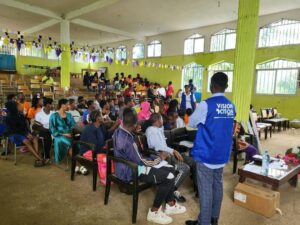Across the world, a woman’s ability to make choices about her body is seen as fundamental to achieving gender equality. In Cameroon, however, the statistics are sobering: 23% of married women report having no say in decisions about their own health, and only 19% of women aged 15–49 use modern contraceptives (Cameroon Demographic and Health Survey, 2018). In the Northwest and Southwest regions areas destabilized by years of violence these numbers are likely even lower, as health services are scarce and cultural taboos remain strong.
“Men are gatekeepers in many communities here,” says a midwife in Buea Regional Hospital who requested anonymity for security reasons. “If a husband refuses, a woman cannot access contraception, even if it is her right.”
For adolescent girls, the challenge is greater. The UNFPA estimates that over 60% of pregnancies among girls aged 15–19 in Cameroon are unintended, many ending in unsafe abortions. In conflict-affected zones, where schools are shuttered and youth are displaced, girls face heightened risks of sexual violence and forced marriages.
Yet, amid these realities, initiatives that engage men as allies are beginning to show promise. In Buea, youth-led organizations are training young men to serve as peer educators on sexual and reproductive health and rights (SRHR). These men facilitate dialogue sessions, challenging myths about contraception and encouraging respect for women’s decisions. “When men speak to other men, the message lands differently,” explains Vegha Bruiceley a 24-year-old community facilitator.
Evidence supports this approach. A 2021 study by Promundo and UN Women found that programs that actively engage men reduce gender-based violence and increase shared decision-making in households. In rural communities in Cameroon, pilot projects have shown that when men accompany their partners to antenatal care visits, uptake of family planning services rises significantly.
Still, barriers remain. Cultural norms often equate masculinity with dominance, and community elders sometimes resist change. Without targeted advocacy, men risk reinforcing rather than dismantling these harmful structures.
Ensuring bodily autonomy in Cameroon will require men to be partners, not bystanders. By integrating male engagement into policy, expanding grassroots initiatives, and challenging harmful norms, communities can break cycles of inequality. When men stand with women, even in the most difficult places, futures become brighter.

Photo of a man leading a comprehensive sexuality education session in the community. Photo Credit: Vision In Action Cameroon
